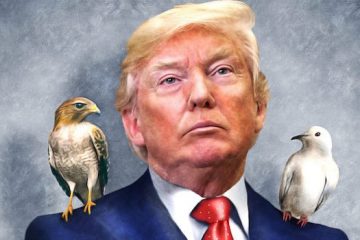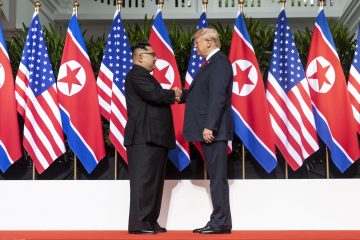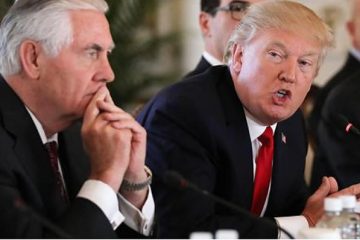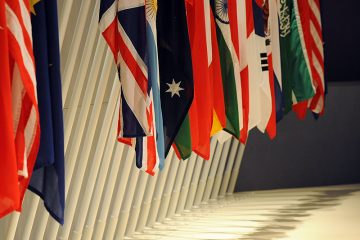Looking Beyond the White House: A Blueprint for the UK’s International Cooperation
The chasm between what the presidencies of Trump and Biden mean for the ‘special relationship’ between the US and the UK has starkly demonstrated how dependent the UK is on the occupant of the White House for its relationship with the US. It would be easy for the UK to forget the lessons it learned from engaging with Trump, who put less value on the bilateral relationship with the UK, because of the comparative enthusiasm of President Biden. However, it is exactly the experience of the Trump era that should convince UK policymakers to think about how to insulate the UK from volatility in the White House. US-UK cooperation on areas like security and defence will never be in question, but the likelihood of a broad trade deal, …
October Surprise: How Foreign Policy Can Shape US Presidential Elections
The president’s recent diagnosis with Covid-19 sent the US presidential election race into a tailspin. As Donald Trump and Joe Biden jockey to regain control of the media narrative at a crucial phase of the campaign, speculation about a possible “October surprise” is widespread. Today, the term refers to any news story that breaks late in an election cycle and has the potential to affect the outcome of the election. Yet its origins are firmly rooted in foreign policy. In particular, the phrase describes a sitting president’s alleged propensity to manipulate events to boost their electoral prospects. The president’s recent tweet calling for all remaining US forces in Afghanistan to return home by Christmas has fueled suspicions that Trump is playing politics …
A Contrarian View of Turkey’s Incursion into Northern Syria
Global attention has focused on the Middle East once more after Turkey launched a military operation, named Peace Spring, moving into Northern Syria. The incursion was made possible by the prior withdrawal of US troops. Beforehand, there was little outwardly indication of the troubles to come: Daesh’s territory was conquered and the US and Turkey cooperated in the region. However, everything started to fall apart after the phone call between President Erdogan and President Trump, in which he agreed to withdraw US troops from Northern Syria, became public. Since then, commentators have criticized President Trump’s decision to withdraw, and Turkey’s actions and intentions. It has been claimed that Turkey is solely motivated by its conflict with Kurdish forces, who have …

Hawk, Dove, Eagle or Headless Chicken? US Foreign Policy under Trump
In early September, President Donald Trump lost his third National Security Adviser, John Bolton. Since then it emerged that the two clashed over a number of issues, with the former advocating for US intervention in a number of countries and the latter favoring a less confrontational approach. Reportedly, Trump quipped that “if it was up to John, we’d be in four wars now.” In fact, the president has repeatedly stated his aversion to foreign (mis-)adventures. Trump’s “America First” approach to foreign policy has been at odds with Bolton’s “America Everywhere” approach from the outset. Why, then, did a president with such dovish tendencies chose a hawk’s hawk as National Security Adviser? What does the ouster of John Bolton tell us …

Three reasons why foreign policy negotiations during the 2020 campaign season are a bad idea
“Deals are my art form. Other people paint beautifully on canvas or write wonderful poetry. I like making deals, preferably big deals.” [Donald Trump, The Art of the Deal] If history is any guide, there is reason to hope that President Trump belatedly takes up painting this campaign season. Over the next 18 months or so, as always seems to be the case in American politics, the looming presence of a presidential election will throw up a whole host of impediments to the pursuit of optimal diplomatic agreements abroad, including with China, Afghanistan and North Korea. A brief look back at critical negotiations during the wars in Vietnam and Iraq suggests a crucial lesson: electoral politics and diplomacy do not mix …

Trump & Tillerson: The End of a Rocky Relationship
In yet another major shake up of his administration, Trump, via Twitter, has declared that he will be replacing Secretary of State Rex Tillerson after only fourteen months, the shortest occupation of the position in modern history. Tillerson will be replaced by CIA Director Mike Pompeo after months of both public and private disputes between the former head of Exxon Mobil and the US President. Administration officials have claimed Tillerson was unaware of his imminent release, allegedly learning only briefly of his impending firing. For those who have been keeping up to date with the inner machinations of the controversial administration, it is concurrently unsurprising that Tillerson has met this fate, and surprising that it has taken this long. The …

The Trump-Kim Summit: Three Reasons Why We Got This Far
Donald Trump surprised the world by accepting an invitation to meet with North Korea’s leader Kim Jong-un. The announcement came unexpectedly, after more than a year of rising tensions between the United States and North Korea over the latter’s nuclear programme. What are the reasons for this diplomatic about-face? We can identify three reasons that have led to this development. The first is North Korea’s long-standing desire of building bilateral negotiations with the United States. The second reason is President Trump’s preference for personal and unconventional diplomacy. Finally, South Korea’s mediating role under the Moon administration has created the conditions to reopen diplomatic contacts between the two opponents. North Korea’s Quest for US Recognition Although North Korea has repeatedly threatened …

On the Margins: Meetings to Watch at the Hamburg G20
Summits are not just — or even mostly — about what happens in the formal leaders’ meetings. What happens on the sidelines often has the largest effect on steering the course of international politics. This is the first year that the G20 summit could end up as a failure, advancing little in the way of substantive progress on the global governance agenda, chiefly owing to the group now having to contend with Donald Trump taking America’s seat at the summit table. Trump’s ‘America First’ agenda — typified by its economic protectionism and rejection of the established multilateral order — is entirely antithetical to the G20’s previous commitments to reject protectionism and safeguard the liberal, rules-based, multilateral governance order. This year’s G20 …









